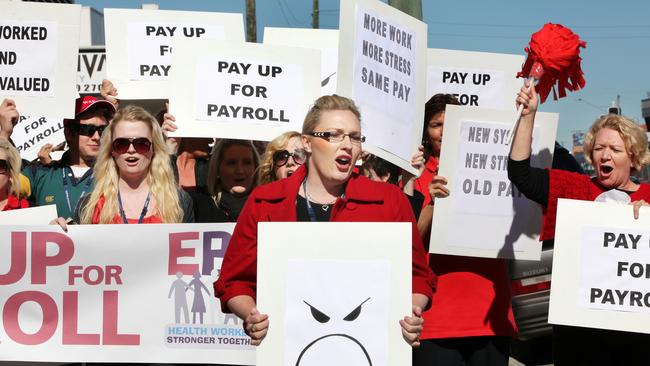Editorial: Queensland Health payroll debacle could happen again
The hard lessons learnt from the Queensland Health payroll debacle are beginning to wane. Hopefully they are remembered before a disaster of similar magnitude occurs, writes THE EDITOR

Opinion
Don't miss out on the headlines from Opinion. Followed categories will be added to My News.
THE Health payroll debacle of 2011 was a seminal event in Queensland political history.
The issue was originally dismissed by the Government as teething problems with a new IT system when The Courier-Mail began reporting cases of Queensland Health workers being underpaid or not paid at all.

However, it quickly morphed into a full-blown scandal when hospitals began resorting to handing out coffee vouchers and referring unpaid workers to charities for aid.
The fiasco cost the then Bligh government its final vestige of credibility. The party of the worker could not pay its workers – not properly anyway.
The political damage escalated in concert with the cost of ensuring the payroll system could operate efficiently enough not to routinely rip off doctors, nurses and any other health professionals.
Over the ensuing years, the very mention of an IT project suffering problems has been enough to make a minister break into a cold sweat.
If there was a silver lining from the Health payroll debacle, it was that it forced much greater rigour and care into the process of procuring IT platforms from the private sector.
With this in mind, it is disturbing to learn that the current collective cost of blowouts from the 55 IT project being undertaken by the Palaszczuk Government amounts to almost $250 million.
What makes the matter worse is the fact the departments with the biggest blowouts are Queensland Health and the Department of Housing and Public Works – the two departments that were ultimately responsible for the Health payroll fiasco.
Unsurprisingly, the Palaszczuk Government has trotted out trite rhetoric about projects changing “scope” and ensuring they are “fit for purpose”.

This is the same brand of pomposity that was being doled out when it was becoming evident that the introduction of the new Health payroll system had gone pear-shaped.
Minor changes in scope may be required on occasions after government has ordered an IT system.
However, every inquiry and report that has occurred following the Health payroll fiasco warned of the need to nail down the requirements of what is needed before signing a contract to avoid foisting significant additional costs on to Queensland taxpayers.
Yet Queensland Health is trying to claim that a projected $256 million blowout in the new digital hospital program was nothing to fuss over because it is “entirely normal and expected for large and complex
ICT projects to have some cost and time variation…”.
This is an extraordinarily lackadaisical attitude from the department that went live with a new payroll system before it knew whether the platform could perform its primary role of calculating and transferring the wages of individuals.
Sadly, it appears the hard lessons learnt from the Health payroll debacle are beginning to wane.
Hopefully, a disaster of similar magnitude doesn’t occur again before they are remembered.
BANKS STILL PUT PROFITS FIRST
AS IF their approval rating couldn’t get any lower, the banks are at it again, this time targeting older Australians.
You don’t have to be a mathematical genius to realise that dishing out home loans to customers aged in their 70s means that, with the standard terms being 25 or 30 years, these people will be required to make minimum repayments until they are 100.
You also don’t need to be too clever to see that, with the average life expectancy of Australian males and females being 81 and 84 respectively, according to latest World Health Organisation data, the majority of these customers will simply not be around to service the loans. And for those who are, where will the money for repayments come from? These factors don’t appear to bother the banks, which continue to put profit before principle.
Consider the following – a 79-year-old borrower is given a $210,000 home loan for 25 years; a couple, aged 76 and 77, is granted a $250,000, 30-year, interest-only loan; and another pair, 72 and 73 years old, scores a $1.46 million investment principal-and-interest loan.
Such examples would suggest that lenders are thumbing their noses at regulators and their attempts to crack down on irresponsible and unconscionable behaviour.
Last year, the Royal Commission into Misconduct into the Banking, Superannuation and Financial Services Industry highlighted the loose lending standards of banks, including the “fees for no service” scandal.
Next month, Commissioner Kenneth Hayne will hand down his final report, which is expected to demand greater regulation and accountability. Surely, among the recommendations will be to display a greater duty of care in rigorously assessing every borrower’s individual financial circumstances.
Older Australians, like all adults, take out loans for a variety of reasons. Some want to help their children secure a foot in the tough property market, and many are acting as guarantors by using the assets they’ve amassed over their lifetime. This is all well and good.
People have a right to make their own choices and no loan seeker should be discriminated against because of their age. But at the same time, risks must be calculated responsibly to protect them from undue financial hardship.
Responsibility for election comment is taken by Sam Weir, corner of Mayne Rd & Campbell St, Bowen Hills, Qld 4006. Printed and published by NEWSQUEENSLAND (ACN 009 661 778). Contact details are available at couriermail.com.au


